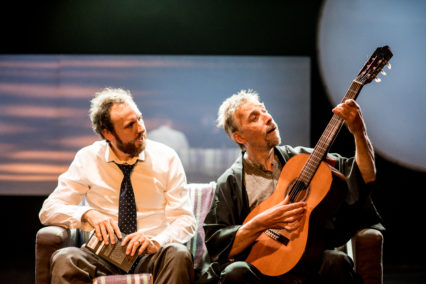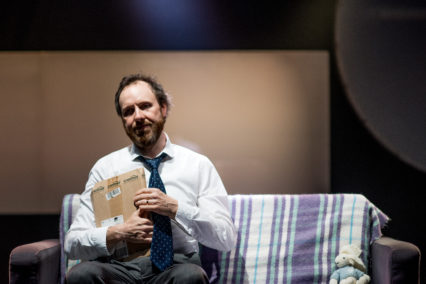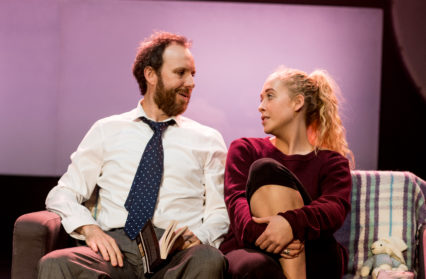Elin Williams is at the National Eisteddfod in Abergavenny to cast a critical eye over a production of Rhith Gân by Wyn Mason.
At this year’s National Eisteddfod in Abergavenny, there was a fresh selection of new writing being debuted at the ‘Cwt Drama’ within the ‘Pentref Drama’ on the Maes. A small red building in the style of a shed, the Cwt is the perfect place to exhibit some of the best of new Welsh language writing. Its small space is minimalistic, allowing one to focus on the importance of the writing. This year’s main production, in partnership with Theatr Genedlaethol, was the winner of last year’s drama medal: Rhith Gân by Wyn Mason.
 We first see Orin (Rhodri Evan), a middle-aged man in a bedraggled suit and tie, eagerly rip into an amazon package. He’s bought a second hand version of a collection of poems by Li Bai, an influential Chinese poet of the Tang Dynasty. Mason admits that the idea for the play was inspired by musician Gareth Bonello’s work on the same topic. This inevitably means that sound and music become an integral part of the piece, atmospheric sounds and music provided by Bonello himself on stage. Whilst attempting to immerse himself in the poetry of Li Bai, Orin is interrupted by his obnoxious teenage daughter Elen (Saran Morgan), typically annoyed by her mother who refuses to do anything to celebrate her 18th birthday the next day. She prods her father, questioning why he married her until he eventually loses his temper, revealing his true frustration with the assumed banality of his everyday life.
We first see Orin (Rhodri Evan), a middle-aged man in a bedraggled suit and tie, eagerly rip into an amazon package. He’s bought a second hand version of a collection of poems by Li Bai, an influential Chinese poet of the Tang Dynasty. Mason admits that the idea for the play was inspired by musician Gareth Bonello’s work on the same topic. This inevitably means that sound and music become an integral part of the piece, atmospheric sounds and music provided by Bonello himself on stage. Whilst attempting to immerse himself in the poetry of Li Bai, Orin is interrupted by his obnoxious teenage daughter Elen (Saran Morgan), typically annoyed by her mother who refuses to do anything to celebrate her 18th birthday the next day. She prods her father, questioning why he married her until he eventually loses his temper, revealing his true frustration with the assumed banality of his everyday life.
It is revealed to us that Orin used to sing in an Indie band, touring throughout his youth, but ultimately ended up working a generic office job. His guitar remains on the side of the stage, a constant reminder of failed dreams, dead ambition. Orin returns to his poetry, attempting to make sense of this ancient writing, when suddenly, Li Bai physically manifests himself on stage. Played brilliantly by Llion Williams, Li Bai becomes a humorous representation of Orin’s self-conscious, handing him his guitar and urging him to create something.
 This universal theme of ‘mid-life crisis’ is, of course, relatable to many, but it is the addition of an ancient Chinese poet as a manifestation of the sub-conscious which is unique. Li Bai appears at times where Orin feels at his most frustrated, challenging him to stop and reflect on how he lives his life, how he copes with grief and loss. Orin faces problems at home too with his desperately angry wife Hanna (Nia Roberts) who, although at first may appear unreasonable and hysterical, is actually harbouring deeper, more complex feelings of her own grief and loss. Roberts delivers scenes which are charged beautifully with raw emotion. Both give performances which will undoubtedly leave the audience feeling desperately sorry for them as they struggle to come to terms with a horrific incident 7 years ago.
This universal theme of ‘mid-life crisis’ is, of course, relatable to many, but it is the addition of an ancient Chinese poet as a manifestation of the sub-conscious which is unique. Li Bai appears at times where Orin feels at his most frustrated, challenging him to stop and reflect on how he lives his life, how he copes with grief and loss. Orin faces problems at home too with his desperately angry wife Hanna (Nia Roberts) who, although at first may appear unreasonable and hysterical, is actually harbouring deeper, more complex feelings of her own grief and loss. Roberts delivers scenes which are charged beautifully with raw emotion. Both give performances which will undoubtedly leave the audience feeling desperately sorry for them as they struggle to come to terms with a horrific incident 7 years ago.
As previously mentioned, the ‘Cwt’ is an ideal space for shining a spotlight on the writing; the minimalistic set is easily changed from a living room into the woods. The addition of sounds and songs from Bonello not only creates a specific atmosphere, but it also facilitates the swift scene changes without feeling clumsy or pronounced.
The revelation towards the end of the play will undoubtedly catch the audience off guard and also allow them to appreciate the subtle indicators within the play. Mason’s script is well crafted and offers realism and humour. The language is natural and contemporary (which is something occasionally lost in Welsh language writing). Rhith Gân is an emotional piece which explores feelings of grief and loss. The loss of others, the loss of identity and loss of understanding. Peppered with music from Bonello, Mason’s play is a fantastic piece of new Welsh writing, one which encapsulates so many contemporary themes and issues.
Elin Williams has written a number of reviews for Wales Arts Review.
(Images credit: Celf Calon)












